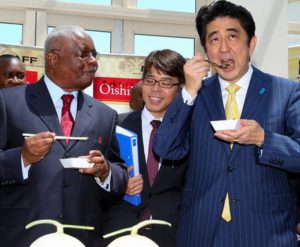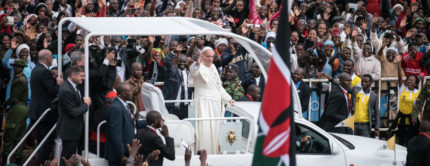Japan is aggressively stepping onto the African continent to snatch influence and resources away from its bitter rival China, which for years has been successfully battling the United States and Europe in gaining access to Africa’s riches.
China has been intensely involved in the African continent for decades and is reportedly the largest or second-largest trading partner for half of the more than 50 countries in Africa. The Chinese government sees Africa as a source of raw materials and a market for finished goods—in fact, in 2012, China’s trade with Africa surpassed $200 billion.
But on a trip to sub-Saharan Africa, Japanese Prime Minister Shinzo Abe declared that Japan is no longer willing to accede Africa to the Chinese. He began his trip in the Ivory Coast, the first visit to sub-Saharan Africa by a Japanese prime minister in eight years.
During a five-day African tour, Abe is pledging more than $14-billion in trade and foreign aid agreements. But in addition to the money, it was his language that raised many eyebrows, particularly in China.
Abe said “job creation and technology transfers” differentiate Japan’s efforts in Africa from those of China, Europe and the United States.
“The benefits of rich resources should be used to create sustained growth and a better life for citizens, and Japanese corporate investment will transfer technology to local hands and create jobs,” Abe said at an investment forum in Mozambique.
In an interview with the BBC, Abe’s spokesman, Tomohiko Taniguchi, criticized Beijing for building lavish headquarters and office towers as donations to African politicians, such as the new $200-million headquarters of the African Union in Addis Ababa, where Abe gave a policy speech.
“Countries like Japan … cannot provide African leaders with beautiful houses or beautiful ministerial buildings,” he said. Japan, he said, prefers to “aid the human capital of Africa.”
But those sounded like fighting words to the Chinese. Chinese Foreign Ministry spokesman Hong Lei said China’s programs in Africa include developing livelihoods and maintaining regional peace.
“China’s aid — not only giving a fish, but teaching how to fish — helps improve the self-development of African people,” Hong said at a daily news conference. “Moreover, China always abides by its promises.”
Since 1963, Hong said, China has sent more than 18,000 medical personnel to 48 African countries, treating more than 200 million people.
“In terms of cooperation in natural resources, China purchases energy from Africa at fair prices while helping enhance the continent’s pricing power in the global market,” he said.
And while Abe pledged to increase aid and investment, including an aid package of $320 million to the continent and assistance worth $25 million to South Sudan, Hong was dismissive.
“Japan claims to boost employment in Africa, but how do you do that if there is no industry to support?” Hong said. “We will wait to see how far the aid programs Abe promised will go.”
Another spokeswoman for the Chinese Foreign Ministry, Hua Chunying, issued this warning to Japan: “If there is any country out there that attempts to make use of Africa for rivalry, the country is making a wrong decision, which is doomed to fail,” she told a press conference.
Former U.S. Secretary of State Hillary Clinton during a visit to Africa in 2012 made no secret about the U.S. desire to beef up its presence in Africa as a business partner—particularly since Africa is home to seven of the world’s 10 fastest growing economies.
Two years ago, Walmart finalized a deal worth more than $2 billion to acquire 51 percent of South Africa’s leading retailer, MassMart, while G.E. signed a deal with the Nigerian government to work together on infrastructure and power projects. In South Africa alone, there are 600 American companies that have invested.
As for Japan, China’s investment in Africa was reported to be about seven times that of Japan in 2011, and its exports to Africa were about five times greater. In addition, Beijing has cultivated close relationships with Africa’s ruling parties, and frequently brings African officials to China on junkets.
In contrast, last year Japan promised up to $32-billion in public and private assistance to Africa over the next five years—confirming its reputation as a donor, rather than a business partner.
“There is this newfangled, unprecedented interest in Africa,” Chris Landsberg, a foreign affairs analyst at the University of Johannesburg, said to the New York Times. “Every single important country — whether China, France, Britain, India, Brazil, Turkey, you name it — they are all queuing up.”
“The United States has been present in Africa probably longer than the Chinese,” said Francisco J. Sanchez, an under secretary for international trade at the Commerce Department, who accompanied Clinton when she went to South Africa. “I am not going to try to guess whether we are behind, or right up even, or whether we are ahead. What I do know is that we need to be present now.”

